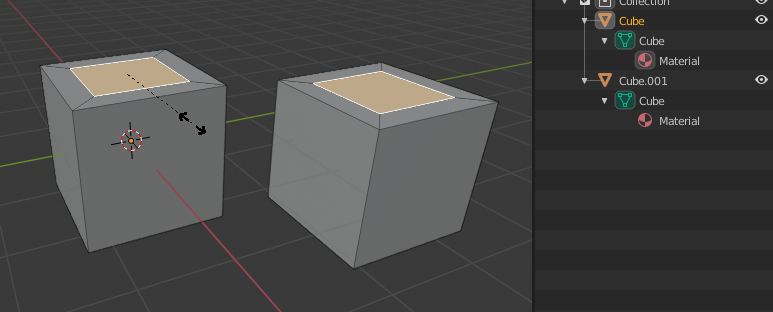Duplicate Linked¶
Reference
- Mode
Object Mode
- Menu
- Hotkey
Alt-D
You also have the choice of creating a Linked Duplicate rather than a Duplicate; this is called a deep link. This will create a new object with all of its data linked to the original object. If you modify one of the linked objects in Edit Mode, all linked copies are modified. Transform properties (object data-blocks) still remain copies, not links, so you still can rotate, scale, and move freely without affecting the other copies. Reference the Examples for the discussions below.
If the original object was animated, the duplicate will link to the same Action. This means that, even though each object has separate transform properties, they will be set to the same values by the animation system. If this is not desired, make the action a single-user copy in the Action or NLA Editor.
- Linked
In the Duplicate Objects Adjust Last Operation panel the Linked checkbox is checked unlike with Duplicate.
Hinweis
If you want to make changes to an object in the new linked duplicate independently of the original object, you will have to manually make the object a „single-user“ copy by LMB the number in the Object Data panel of the Properties. (See Data-Block Menu.)
Siehe auch
Make Single User for unlinking data-blocks.
Examples¶

The Cube object was linked duplicated.¶
The object Cube was linked duplicated, using Alt-D.
Though both these cubes are separate objects with unique names:
Cube and Cube.001, the single mesh named Cube, is shared by both.
As a mesh is edited in Edit Mode in one object, the same occurs in the other cube as well. The mesh data are links, not copies.
In contrast, if one of these two cubes is rotated or scaled in Object Mode, the other remains unchanged. The transform properties are copied, not linked.
As in the previous example, the newly created cube has inherited the material of the original cube. The material properties are linked, not copied.
A common table has a top and four legs. Model one leg, and then make linked duplicates three times for each of the remaining legs. If you later make a change to the mesh, all the legs will still match. Linked duplicates also apply to a set of drinking glasses, wheels on a car… anywhere there is repetition or symmetry.
Siehe auch
Linked Library Duplication
Linked Libraries are also a form of duplication. Any object or data-block in other blend-files can be reused in the current file.
Hinweis
If you want transform properties (i.e. object data-blocks) to be „linked“, see the page on parenting.